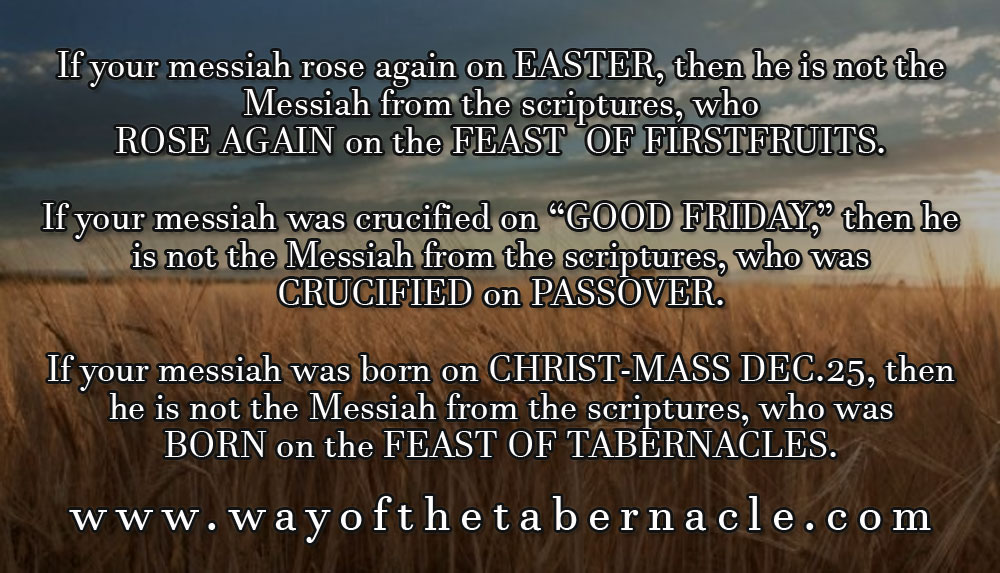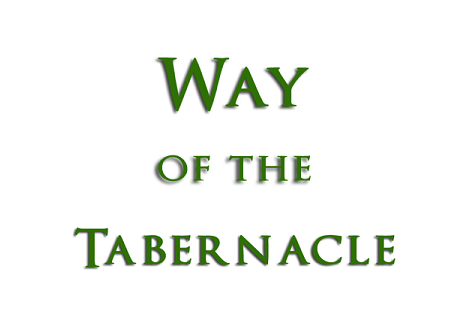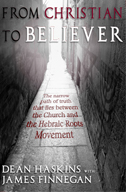The Preparation Day IS Passover
To watch a complete Seder, CLICK HERE
“When evening had already come, because it was the preparation day, that is, the day before the Sabbath . . .” Mark 15:42
There are many false teachings and beliefs that have derived from a lack of understanding of how, exactly, the Father's ordained Sabbaths work. The “church” obviously gets this wrong, because it flippantly blows off ALL of the Father's traditions, and peddles a counterfeit of the faith that was invented in the fourth century by pagans and Jew haters who replaced as many Jewey-sounding things as they could, simply because of their intense loathing of the Jewish people.
In an effort to separate themselves from anything the Jews did, and condemn everything associated with them—even eventually outlawing many things about them and their traditions, early christians wrongly attributed ownership of those traditions to the Jews, rather than understanding they have always belonged to the Father, and were even taught to the Gentile converts by the apostle Paul (1 Corinthians 11:2, 2 Thessalonians 2:15).
But, there's another movement of false teachers (see: “cult”) out there called the “Hebrew Roots” movement, who claim to honor the Father's traditions, and even they don't understand this simple truth: the preparation day mentioned in the Gospels IS the Passover. It is no other day than that. There has never been a “preparation day” associated with the weekly Sabbath. While individuals may have done things on the day before the weekly Sabbath to prepare for their next day's rest, there has never been an entire DAY before the weekly Sabbath called “the preparation.”
To understand WHICH Sabbath is being referred to in any passage of scripture, it is necessary to know the context of the passage, as the weekly Sabbath and the feasts are all called Sabbaths. So, in the case of the Spring feasts (Passover, Unleavened Bread, Firstfruits, and Weeks), there are often three Sabbaths all in the same week—Passover, Unleavened Bread, and the weekly Sabbath. Firstfruits is always the first day of the week following the weekly Sabbath following Passover, and that is the first day of the barley harvest. So, it is necessary to understand exactly which Sabbath is being referenced in a passage to know what is being said.
In the case of Mark 15:42 above, the Sabbath being referenced is the Feast of Unleavened Bread. We know this because the scriptures are clear that Messiah was crucified on the day of Passover, as His disciples asked Him the previous day about where they should have their Seder (Mark 14:12) after sundown. Remember, their days started at sundown, so the Passover began at sundown, and that is when the private Seders were observed in the homes. The temple observance was the next morning, and that is when Yahoshua was crucified with the Passover lambs at the temple. The day following Passover is the high Sabbath of Unleavened Bread, so that is the Sabbath referenced in Mark 15:42.
For a detailed chronology of the events of that week, CLICK HERE.
There being no other day before any other Sabbath called “the preparation,” it is then necessary to understand why THIS day is so called. If it is the day before Unleavened Bread, and it is called the “preparation” for THAT Sabbath, and the day is actually Passover, how is Passover the preparation for Unleavened Bread? What is the spiritual meaning in it?
Throughout scripture we see that leaven generally symbolizes sin, so, the removal of leaven conveys the notion of removal of sin. In Luke 12:1, Yahoshua warns, “Beware of the leaven of the Pharisees, which is hypocrisy,” and in Mark 8:15, He includes Herod in the warning, “Take heed, beware of the leaven of the Pharisees and the leaven of Herod.”
In Corinthians 5:7-8, Paul states, “Therefore purge out the old leaven, that you may be a new lump, since you truly are unleavened. For indeed Christ, our Passover, was sacrificed for us. Therefore let us KEEP THE FEAST (why doesn't the “church” heed Paul's words here?), not with old leaven, nor with the leaven of malice and wickedness, but with the unleavened bread of sincerity and truth.”
So, to be unleavened represents being without sin. But, is that even possible? How can anybody be free of ALL sin, since even Paul admitted that he still battled the sins of his flesh? There is only one sin that condemns, and that is unbelief (John 3:18, Hebrews 3:19). So, to repent of that one sin (unbelief) is to believe, for repentance means “to change one's mind.” That is exactly what the thief on the cross did—he repented of his unbelief, which means that he believed; and that, along with confessing Messiah Yahoshua before men, is what is required in order to be able to be justified before the Father.
To be justified before the Father is to be made righteous. That righteousness can only come from the Father, because no man can make himself righteous, as that would require self-righteousness, or self-justification, and Yah abhors man attempting to justify himself. That was what Yah ultimately revealed to Job—that Job justified himself. Man cannot ever justify himself before the Father, and so, he needs the indwelling Holy Spirit, who not only seals the bride eternally, but also makes her righteous before the Father.
Righteousness comes only from the indwelling of the Holy Spirit, but holiness is the duty of those who have been made righteous, and that is the denying of one's flesh. To deny, or crucify, one's flesh is to stop committing sins of the flesh—the sins we see listed in Galatians 5:19-21. But, those sins of the flesh committed by one who has already been made righteous do not have anything to do with his eternal destiny, but affect the closeness of his relationship with the Father and also his eternal reward. One's child can choose to be disobedient, but that will never make him no longer one's child.
So, to be made righteous in the Father's eyes is to be without the sin that condemns, which is unbelief, and that is only possible by the indwelling Holy Spirit. Those who have the Holy Spirit are no longer condemned, and those who do not have His Spirit, because of their unbelief, are condemned already (John 3:18).
Those who have been made righteous have been made “unleavened,” but there is only one way that happens, and that is through the sacrifice of the Perfect Lamb of Yah. Paul specifically tells us that Yahoshua IS our Passover—the sacrifice that makes it possible for one to be made unleavened, or righteous, before the Father. Without the Passover sacrifice, there is no redemption, and it is through belief in the Perfect Lamb of Yah—that He sacrificed Himself to suffer the punishment for our sin—so that we can be made righteous.
As the Passover Lamb who was sacrificed on the tree, Yahoshua then took His bride's sin to hell, and suffered the punishment for it there. That is the meaning behind Yah's command that the Passover lamb not be boiled or eaten raw, but that it must be cooked over fire (Exodus 12:9). In Zechariah 3, we are shown Yahoshua the Perfect Lamb immediately after His resurrection (after He told Mary Magdalene not to hold onto Him because He had not yet ascended to His Father). He is standing before the Father, the Holy Spirit, and Satan, and the Father says to Satan “Is this not a brand plucked from the fire?”
Also, Yahoshua states in Revelation 1:18, “I was dead, and behold, I am alive forevermore, and I have the keys of death and of hell.” Where would He go to get those keys? Where is sin punished? How could it be imagined that the sin of Messiah's bride would be punished anywhere other than where sin is punished? In hell. So, this is a necessary understanding of Passover—that the Perfect Lamb of Yah was not only killed by crucifixion on a tree, but that He was also burned in the fires of hell to atone for the sin of His bride. Without these truths, even Passover loses its full meaning.
Exactly where, in the pagan Roman Catholic counterfeit called “communion,” or “the Lord's Supper,” is the excruciating pain that the Perfect Lamb of Yah suffered in the fires of hell represented? How is that taught in the pagan counterfeit, when there is actually no lamb as part of the memorial? That entire spectrum of spiritual truth is glossed over in the pagan counterfeit—and, many christians even reject the fact that Yahoshua the Messiah (whom they falsely call “jesus”) even went to hell. This just exposes more of how much of a counterfeit christianity is. The Passover is rejected, as well as what the Perfect Lamb endured and accomplished as the fulfillment of the Passover (the spiritual real substance of the physical foreshadow shown in Exodus).
Passover is the preparation for Unleavened Bread. Without Yahoshua's sacrifice, there is no righteousness in man, for identifying with His sacrifice (believing in Yah's salvation) is the preparation for one to be made righteous, which is to be given the Covenant of marriage—who is the Holy Spirit.
When the Israelites were led out of Egypt (a symbol of the world), and the Holy Spirit led them to Mt. Sinai, they awaited the giving of their covenant, which was a physical foreshadow of Messiah's bride Y'isra-el receiving the spiritual covenant, which is the seal of the Holy Spirit (which is what we see in Acts 2). In the Seder, the Jews would tell the story of how Yah led them out of Egypt after the Passover lamb's blood was spread on their homes, and the death angel “passed over” them. Then, the Spirit led them to the mountain, where they waited to receive their covenant, which was the giving of the Ten Commandments, a foreshadow of the Holy Spirit.
Today, that telling, or “haggadah,” is the testimony the Holy Spirit gives to believers He has led out of the world to be Messiah's bride. For more about how this happens in the life of a believer, CLICK HERE.
How utterly indefensible christianity is for rejecting the very cornerstone of salvation—Passover—which memorializes the only path to salvation, and remembers Messiah in the manner He specifically told us to remember Him (in His death—1 Corinthians 11:24-25), and replacing it with an annual pagan fertility ritual instituted by Semiramis (Ishtar), Queen of Babylon, wife and mother of Nimrod (Baal), and mother of Tammuz.
While most christians typically argue that the actual day they celebrate doesn't matter, they make Messiah a liar, since He said to remember Him in His death—which is Passover, and they make the Father irrelevant, since He's the One who instituted and ordained His Sabbaths to honor His Son, teach His truths, and reveal His prophetic calendar.
And, how false are the modern day teachers of the law (Messiah called them “hypocrites”) to peddle the lie that the preparation day before the Sabbath has anything to do with the weekly Sabbath. That merely demonstrates that those who are lost in the cult of “Hebrew Roots” are just as clueless about the true doctrines of salvation as christians are.
Without the preparation (Passover), there is no redemption. For, He is our Passover, and we can only be made righteous (unleavened) because of His sacrifice. That is the reason Paul said in 1 Corinthians 1:23 that "we preach Christ CRUCIFIED,” which is THE PASSOVER, the PREPARATION to be made righteous.


Salvation
Traditions
Other Truths
But now in Yahoshua the Messiah you who formerly were far off have been brought near by the blood of Christ. For He Himself is our peace, who made both groups into one and broke down the barrier of the dividing wall, by abolishing in His flesh the enmity, which is the Law of commandments contained in ordinances, so that in Himself He might make the two into one new man, thus establishing peace, and might reconcile them both in one body to Yah through the cross, by it having put to death the enmity. Ephesians 2:13-16




